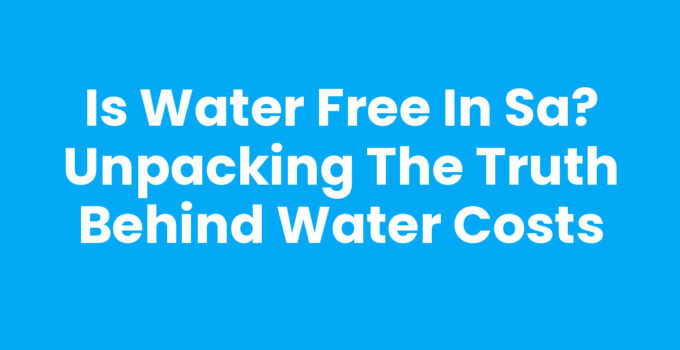Water is an essential resource for life, yet access to it can vary dramatically depending on where you live. In South Africa, the question of whether water is free is complex and layered with economic, environmental, and social implications. This blog post aims to delve deep into this subject, addressing key issues regarding water access, pricing, and what it means for South African citizens.
Is Water Free in SA? Understanding the Landscape
The straightforward answer to the question, “Is water free in SA?” is no, but the situation is nuanced. The South African constitution grants every citizen the right to access water. However, this does not mean that water is free for all. Below, we break down what you need to know about water availability and costs in South Africa.
Government Initiatives
The South African government recognizes the importance of access to clean water. Initiatives such as the National Water Act of 1998 aim to ensure that everyone has access to water for basic needs. However, implementation varies widely across different regions, particularly in under-resourced areas.
Municipal Water Supply
In urban areas, water is typically supplied by municipal authorities who establish tariffs for usage. These tariffs might not apply to the first few kiloliters of water consumed, which is often allocated for basic needs and may be provided free or at a highly subsidized rate. However, once this minimum limit is exceeded, charges can be significant.
Costs of Water Infrastructure
It’s important to recognize that the infrastructure required to deliver water, including pipelines and treatment facilities, incurs costs. Municipalities face significant challenges in maintaining and upgrading this infrastructure, which impacts the pricing of water services.
Water in Rural Areas
In rural areas, access to water may be even more complicated. Many households rely on boreholes, springs, or rivers, but the quality and availability of this water can vary greatly. While these sources may seem free, there are often hidden costs such as transportation, purification, and maintenance of equipment, which can burden families.
You Might Also Like: Exploring Museums and Galleries in Bloemfontein: A Guide
Understanding Water Tariffs and Usage in South Africa
Water tariffs are determined by various factors including location, water source, and municipal policies. Here’s a breakdown of how tariffs work in South Africa:
1. Basic Water Allocation
Many municipalities offer a minimal allocation of water for free to ensure that all citizens can meet their basic needs. This amount is designed to cover drinking, cooking, and basic hygiene. Households will move to a paid model once this allocation is exceeded.
2. Tiered Pricing Structure
Once the basic allocation is surpassed, many municipalities employ a tiered pricing model where the cost per liter rises with higher usage. This is intended to encourage conservation; the more water you use, the higher your rate.
3. Community Impact and Challenges
The cost of water affects poorer communities disproportionately, often leading to severe quality of life challenges. Inadequate access to clean water can result in a myriad of health issues and hinder economic opportunities.
Further Reading: Explore Zeeman Street, Bloemfontein: A Hidden Gem
Conclusion: Navigating Water Costs in South Africa
The question of whether water is free in South Africa is complex. While there are provisions for free basic water, the realities of tariffs and access present a multifaceted landscape. Understanding these dynamics is crucial for residents to navigate their personal water usage and community engagements.
In summary, while some water may be allocated free of charge, the infrastructure and associated costs for water services mean that most South Africans will have to pay for their water needs. Staying informed and engaged with local policies can help address these challenges.
Recommended Guide: Understanding the Cost to Build a House in Bloemfontein
Frequently Asked Questions
Is there a free basic water allocation in South Africa?
Yes, many municipalities provide a limited amount of water for free to ensure basic needs are met.
How are water tariffs structured in South Africa?
Water tariffs in South Africa often utilize a tiered system, increasing the price per liter as consumption rises.
What are the challenges of accessing water in rural South Africa?
In rural areas, households often depend on natural water sources, which can be unreliable and may involve hidden costs for transportation and purification.



